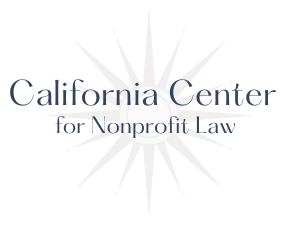The California Center for Nonprofit Law Blog


California State Oversight Agency Recommends Changes to Nonprofit Contracting Process
The Little Hoover Commission (LHC), California’s independent state oversight agency, recently published policy recommendations to reform state grantmaking and nonprofit contracting processes to improve partnerships with charitable organizations. According to the LHC, current state practices create barriers that block effective…
California Court Rules Ministerial Exception Does Not Bar Wage and Hour Claim
A California appellate court has reversed a trial court judge’s grant of summary judgment in favor of a Zen Buddhist church in an employment law dispute. The appellate court rejected the trial court judge’s reasoning that the ministerial exception to…
Five Things California Charities Need to Know about Annual Registration Renewal Requirements
Navigating California’s regulatory landscape can be challenging for charitable organizations, especially when it comes to annual registration renewal requirements. Compliance with the rules set by the California Attorney General’s Registry of Charities and Fundraisers is critical to maintaining good standing.…
Should a Church Obtain a §501(C)(3) Determination Letter from the IRS?
Under Internal Revenue Code (IRC) §508(c)(1)(A), churches are automatically considered tax-exempt under §501(c)(3). As a result, churches are not required to seek Internal Revenue Service (IRS) recognition of that tax-exempt status through a formal determination letter. However, for various reasons,…
GoFundMe Sets Up Millions of Unauthorized Nonprofit Donation Pages
After the Friends of the San Bruno Public Library discovered a GoFundMe page that it didn’t set up, other charities also began discovering that they, too, had GoFundMe pages – none of which the organizations had authorized. An initial statement…
California AB 1318 to Protect State Funding of Charitable Nonprofits
California Governor Gavin Newsom signed California Assembly Bill 1318 (AB 1318) into law on October 7, 2025. AB 1318 is a direct response to anticipated federal government efforts to revoke some charitable organizations’ federal tax-exempt status based on their missions and…
NASCO Issues Annual Report on State Charity Enforcement and Regulation
The National Association of State Charity Officials (NASCO) has issued its Annual Report on State Enforcement and Regulation, which covers the period from September 2024 through September 2025. Different states have different charitable solicitation requirements, some of which specifically target…
CA Governor Signs Various Bills into Law Impacting Employers, including Churches
California Governor Gavin Newsom recently signed several bills into law and vetoed others that affect labor and employment law, including those affecting churches with employees. These bills take effect on January 1, 2026, unless stated otherwise. Understanding the impact of…
Ninth Circuit Clarifies “Bona Fide Religious Belief” in Religious Discrimination Cases
The U.S. Court of Appeals for the Ninth Circuit recently issued a decision clarifying the “bona fide religious belief” element that plaintiffs must prove for a prima facie religious discrimination claim under Title VII. In Detwiler v. Mid-Columbia Med. Ctr.,…
IRS Updates “Stay Exempt” Resource
The Internal Revenue Service (IRS) has updated its “Stay Exempt” online resource. The content of this resource has been incorporated into the main IRS website, replacing the previous separate website, “StayExempt.IRS.gov.” The new link to the Stay Exempt online content…










